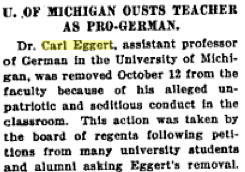 |
- History of Education Quarterly > Vol. 33, No. 1, Spring, 1993 "World War I and the Attack on Professors of German at the University of Michigan. Via JSTOR.
- http://www.umich.edu/~aahist/carlos1914.html
A strong anti-German sentiment was another concern at The University of Michigan. It especially affected the faculty. In October 1917, Professor Carl E. Eggert of the German Department was dismissed by the Board of Regents for allegations made by another member of the faculty that he was pro-German (Peckham, 145). Unfortunately, this was not an isolated incident. In 1917 Professor Ewald Boucke, a German national, asked for a leave of absence for the duration of the war because he felt uncomfortable under the suspicion of his colleagues. His request was granted "indefinitely," and when he asked for reinstatement at the end of the war he was denied (146). The National Security League also requested that an official inquiry be made into the loyalty of all University faculty, but the Regents ignored the request (Regents, 159).
Hobbs also kept watchful, suspicious eye on his university colleagues for anything that appeared to be pro-German sentiment. He was very annoyed by speeches that were allegedly given by some members of the Department of German and, according to campus legend, once assaulted with his cane on an Ann Arbor street one of the German professors for making such remarks. It is a matter of record that in October 1917, the red-bearded Hobbes appeared before the Board of Regents to present evidence of disloyalty against Professor Carl E. Eggert of the Department of German. Professor Eggert was then dismissed by the University.
- Carl Eggert, Faculty History Project, University of Michigan


